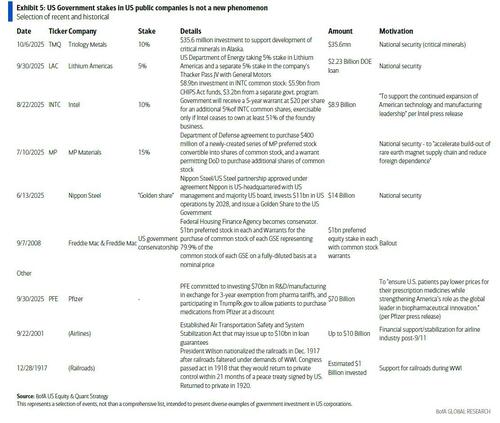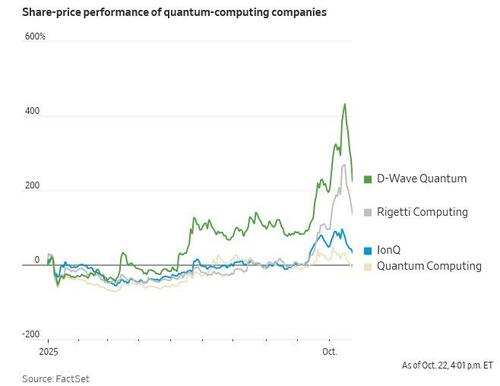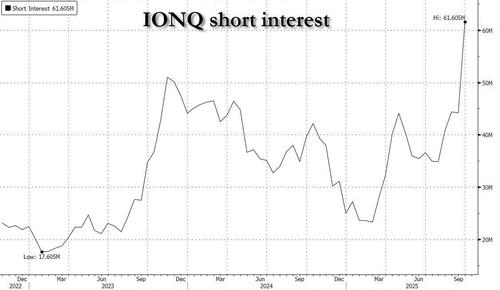A few days ago, when we were looking at the rapidly growing list of companies that Uncle Sam is "buying", we thought to ourselves: these are all the companies that value investors had long ago left for dead, and which had seen a dramatic buildup in shorts... who were summarily nuked when the White House, very much like Reddit's Wall Street Apes, decided to spark a meltup frenzy to keep the high-beta junk names soaring in what has been a tidal, rolling short squeeze from one sector to another and back again.
Indeed, as Bank of America shows, in just the past few weeks the US government had taken equity stakes in tech, pharma, rare earths and metals (as an side, the US government investing in stocks is not a new phenomenon, but has been more prevalent for bailouts than strategic investments in recent decade).
So, when looking at the above chart, we said to ourselves that if there was one sector that was ripe for White House "investment", it would be the quantum names: with short interest in the 20% range, these names - some of which may even not be frauds in the long run and end up successful in a decade or two - were long ago left for dead by "serious investors", and were just begging for a spark to trigger a massive meltup.
If only we had put our money where our mouth was... we would have a whole lot more money because late on Wednesday, the WSJ reported that the Trump's Commerce Department was in talks with several quantum-computing companies to buy equity stakes in exchange for federal funding, a signal that the Trump administration is expanding its interventions in what it sees as critical segments of the economy.
The deals with the quantum companies haven’t been completed and might change. A Commerce document soliciting funding applications says the deals might include warrants, licenses to intellectual property, royalties or revenue sharing in addition to equity stakes.
Companies including IonQ, Rigetti Computing and D-Wave Quantum - among the most shorted companies in the world - are discussing the government becoming a shareholder as part of agreements to get funding earmarked for promising technology companies, according to people familiar with the matter. Other companies such as Quantum Computing and Atom Computing are considering similar arrangements.
Yet while in theory such an arrangement might make sense, in principle one wonders if Trump isn't really fucking with the short and hoping to spark sequential squeezes across all high beta segments of the market and to keep stocks afloat that way. We say that, because unlike some previous sizable investments, in this case the companies are discussing minimum funding awards from Washington of $10 million each. And just to make sure that all shorts are burned, the WSJ added that "other technology companies are also expected to vie for the funding."
The discussions are the latest example of the Trump Industrial Policy, the pinnacle of which manifests in the administration's moves to become a shareholder in some companies. Trump and Howard Lutnick have said the government should share in a company’s upside since taxpayer money provides financial support and a stamp of approval. Even if the upside is based on a tiny $10 million sliver.
As correctly predicted on this site first...
... in August, the government agreed to take a nearly 10% stake in chip company Intel in exchange for converting almost $9 billion in previously awarded grants to equity. The arrangement would make the government Intel’s largest shareholder and followed a similar deal with one of the few US producers of rare-earth materials. The Energy Department received warrants giving it the right to buy shares of a lithium startup at a set price in exchange for a government loan.
The funding for quantum companies would be one of the first significant signs of support for what is viewed as a critical technology sector from Washington. Quantum computers are seen as a critical next-generation technology because they can not only quickly perform computations that would take today’s computers eons, but are key to hacking sophisticated 256 bit and higher encryption schemes. That sort of advance could make it easier to find new drugs, materials and chemicals while making every segment of the economy more efficient; of course by the time it is more efficient, there will be no workers as they will all be replacted with AI chatbots.
Ironically, shares of companies in the space have surged this year in what was a huge short squeeze, crushing the shorts, though they have plunged in recent days, wiping out the longs.
Now it's the shorts' turn again to be steamrolled courtesy of record short interest in the quantum sector.
The US government's presence here is hardly surprising: companies from IBM to Microsoft are investing in quantum computing, as is China. Earlier today, Google said that it showed a quantum computer can run 13,000 times faster than classic supercomputers and potentially speed drug discovery and materials science.
Deputy Commerce Secretary Paul Dabbar, a former quantum-computing executive and Energy Department official, is leading the funding discussions with companies in the industry, the people said. Bohr Quantum Technology, the company Dabbar co-founded and led as chief executive for four years, isn’t a candidate to receive funding, a Commerce Department official said.

Quantum Computing CEO Yuping Huang said the government’s potential equity stakes in companies in the industry are exciting. A Rigetti spokeswoman said the company is continuously engaging with the government on funding opportunities. Allison Schwartz, head of government relations for D-Wave, said the company wants to sell systems that can solve the government’s hard problems and get a return on investment. Atom Computing and IonQ declined to comment.
The funding the companies are seeking comes from the Chips Research and Development Office, which Lutnick has reorganized under his overhaul of how the agency manages 2022 Chips Act funding. He recently clawed back several billion dollars from a tech research initiative funded by the Biden administration.
Loading recommendations...


